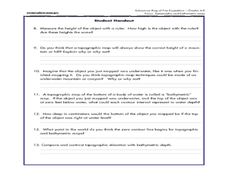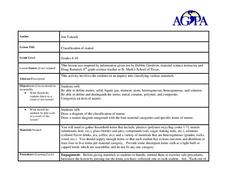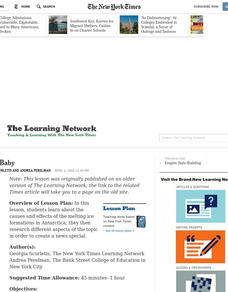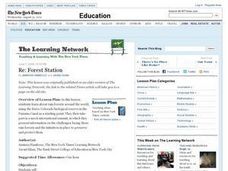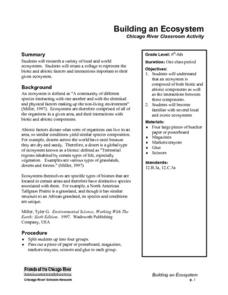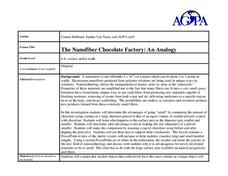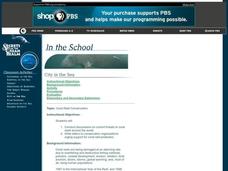Curated OER
Zoo Poo
Students use Internet research to determine the amount of carbon dioxide produced per unit energy for biomass and coal. In this alternative energy instructional activity, students research to find out how much energy and carbon dioxide...
Curated OER
The Water Cycle
Fourth graders explore changes in water forms. In this water cycle lesson, 4th graders build a water cycle model and monitor it for 2 weeks in order to understand that water changes state as it moves through the cycle.
Curated OER
A Watered-Down Topographic Map
Eighth graders explore the ocean floor. For this topography lesson, 8th graders compare topographical maps to bathymetric charts. They will create a topographic map and note landmarks and other land features.
Curated OER
In Harm's Way: Natural Disasters in My Community
Eleventh graders research and debate natural disasters that have occurred in their community. They assess whether these natural disasters were avoidable or were accidents. They investigate the extent of insurance coverage for disasters.
Curated OER
Classification of Matter
Students investigate common household items and classify them into types of matter. In this matter lesson, students group given items into categories based on their characteristics. They also complete a concept map about matter and...
Curated OER
Learning About Animal Shelters for Earth Day
Students explore habitats. in this ecology and animal habitat lesson, students listen to the book A House is a House for Me by Mary Ann Hoberman. Students discuss the basic needs of animals and go on a nature walk to observe animal...
Curated OER
You Can Die Here
Students examine Death Valley including the amount of precipitation and winds that it gets. In this climate based lesson students explain the reasons for the amount of precipitation and windward patterns in Death Valley.
Curated OER
Reduce Reuse Recycle
Students discover methods that can save the planet by recycling. For this sustainable planet lesson, students read The Berenstein Bears Don't Pollute Anymore, and practice memorizing the 3 R's. Students write commitment letters...
Curated OER
Ice, Ice, Baby
Students explore the causes and effects of the melting ice formations in Antarctica; they then research different aspects of the topic in order to create a news special.
Curated OER
Fire Escape
Learners explore the effects of the volcanic eruption of Nyiragongo in Congo as a springboard to exploring past examples of volcanic eruptions and their respective relief efforts.
Curated OER
Re: Forest Station
Young scholars read an online article to explore rainforests of the world starting with the Barro Colorado reserve in the Panama Canal. They participate in a mock international summit about rainforest conservation issues.
Curated OER
The Big Hideout
Learners identify the types of camouflage used by animals in the desert. They work together to create their own animal creating their own type of camouflage. They determine how well the camouflage works.
Curated OER
Tectonic Plates, Earthquakes, and Volcanoes
Challenge geography classes to locate the major volcanoes and earthquake faults on a world map. In groups, they identify the pattern made and examine the relationship between the locations of the faults and volcanoes and tectonic plates....
Curated OER
Building an Ecosystem
Students research a variety of local and world ecosystems. Students will create a collage to represent the biotic and abiotic factors and interactions important to their given ecosystem.Students will understand that an ecosystem is...
Curated OER
The Nanofiber Chocolate Factory: An Analogy
Students investigate Nanotechnology. In this physic's lesson, students evaluate a hands-on model made from chocolate syrup and pretzels to determine the advantages of size. Students weigh chocolate syrup to determine it's wait in grams,...
Curated OER
Climate Change
Students focus on the production of maple syrup in Northern New England as they study the effects of climate change. They investigate other environmental factors on the forests of Northern New England.
Curated OER
Genetically-Modified Food
High schoolers investigate the pros and cons of genetic engineering. They watch a short Bill Moyers video, conduct Internet research, create a poster, participate in a pro/con debate, and write an essay expressing their personal feelings...
Curated OER
Conservation in Costa Rica
Students brainstorm what they do that requires land use and use a worksheet to calculate their footprint (the total area of land and water required to produce all the resources they consume). They then compare their footprints to each...
Curated OER
Write Picture Captions
High schoolers notice and investigate a large range of devices for presenting texts-captions. Students write original captions for several audiences. High schoolers write a fictional news story based around a certain caption.
Curated OER
Everything You Do Makes a Difference
Students choose a current environmental issue and research historical conditions as well as present conditions. They assess
the changes in ecosystems, populations of specific species, air quality, or any other aspect of an ecosystem.
Curated OER
Feeling the Heat
Students investigate the urban heat island effect. In this urban heat island effect lesson, students learn how trees, grass, asphalt, and other things on the school grounds effect temperature. They use the information to generalize it to...
Curated OER
Reading Satellite Images
Students analyze satellite images. In this astronomy lesson, students examine 3 satellite images in order to understand how satellite images are taken and what they can teach scientists.
Curated OER
Coral Reef Conservation
Students conduct discussions on current threats to coral reefs around the world and write letters to conservation organizations urging support for coral reef protection.
Curated OER
The Cream of the Crop
Students read and discuss article, "Simple Method Found to Vastly Increase Crop Yields," then research the basic components of conventional and organic agricultural methods. They, in groups, organize and present their research to the class.




